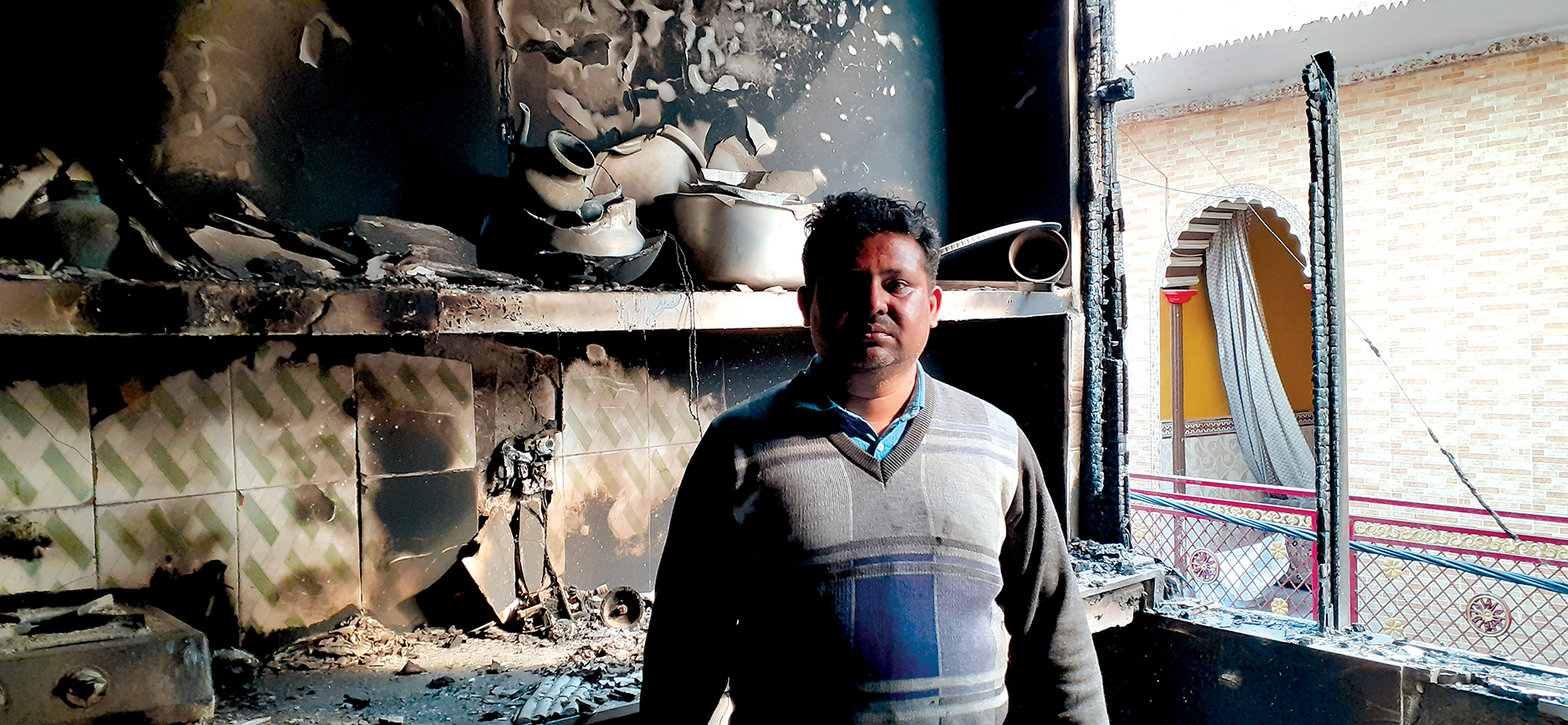
LAST WEEK, the nation stood still as North East Delhi witnessed the worst riots to hit the capital since 1984. As a journalist, I was naturally assigned the task of writing about the aftermath of this gruesome violence that had hit the city. So, as the violence died down on February 28, we hit the streets of North East Delhi to witness what the carnage had brought about just 33 km from my place in Noida.
What I witnessed definitely shook me to the core. I saw buildings burnt down to the ground and shops destroyed. It was tough during these times not to be overwhelmed by emotions. When I went to a house in Khajuri Khas, I was greeted by its owner Mohammad Farooq. His face mirrored the hollow feeling he had inside. His house was completely gutted.
“My father worked at the Food Corporation of India for 30 years, and he saved penny by penny to build this house. He spent around Rs 50 lakh on it, thinking that now me and my brother will always have a roof over our head,” Farooq says standing in front of his burnt kitchen, tears rolling down his cheeks. At this point of time, I just wanted to hug him and console him saying everything will be fine. But I had to keep myself calm and neutral.
At one point, he aimed at a charred sewing machine, saying, “My wife planned to start her own tailoring business, and I had bought this for her. Usne bola tha ki hum ek saath ghar chalayenge (She said that we both would run the expenses of the family together).”
At this point of time in the dark room, filled with broken glass on the floor, I stood still for a moment, not knowing what question to ask him. For the first time in my reporting career, I was filled with sorrow, and was about to cry. But I am a journalist, and the first thing that I was taught was to always be neutral and always look at everything objectively. At this moment, I wish I did not have to do that.
The next day was even more difficult. I had to meet and talk to the family of those who lost their lives in these riots at the mortuary of the Guru Teg Bahadur hospital, and had to ask them questions. Previously also I interviewed the family of a deceased in the Karol Bagh hotel fire. But that was one family. Here it was more than that, obviously.
When I went there, I saw almost 10 families lined up, most of whom were looking for their missing family members, with the last hope of finding them ending in the mortuary. Just the thought of your finding your loved one, unexpectedly, in the cold of a mortuary sent shivers down my spine. So, I could very well imagine what they were going through. But the silenced and grief-stricken faces of the men and women I met there, the worried expression on their faces – made my time there really difficult. I wanted to solve all their problems, but obviously couldn’t.
The worst part was when I was speaking with someone whose family member had just passed away. Naseem Alam’s 22-year-old son Arshad had gone out to check if his mobile repairing shop in Seempuri was fine. His body was found two days later at a nullah nearby. On Sunday, Alam came for his missing son, and like everyone his search ended when he came to the mortuary.
As he came out, he sat on the footpath bearing a stoic expression. And then suddenly after a few minutes, he started crying uncontrollably. It was a moment that had to be captured. It showed the brutality and the real face of violence and how much harm it can cause in a person’s life. I went in hurriedly, took out my mobile phone and quickly started taking his photos. And there were many other reporters around, who also came in for a picture, but I was the ‘lucky’ one who captured that moment.
It was then that I suddenly heard a woman say behind me. –“Do paise ki sharm nahi hai in mediawalon mein”(There is not even two ounces of shame in these journalists). I know it’s not appropriate to picture someone in their biggest moment of grief – losing his child. But as a journalist it is my duty to show the people – my readers, the true face of the riots and as they say, it is a part and parcel of a journalist’s job to be abused by the public. But at least I was not shoving a mic in someone’s mouth or calling them names on national television. I was just doing my job and will continue to do what I came to the profession for – to reveal the truth.
Around 100 international flights were cancelled at Delhi airport due to disruptions linked to the…
Due to mounting debt and constant pressure, he decided to kill his family and leave…
According to the police, information was received from GTB Hospital regarding the admission of an…
Over 75,000 fans filled Jawaharlal Nehru Stadium as Karan Aujla delivered one of India’s biggest…
Jewellery, silver and cash worth Rs 1.15 crore recovered after police apprehended three accused, including…
Featuring over 70 tribal artists and 1,000 artworks, the festival at Travancore Palace will showcase…